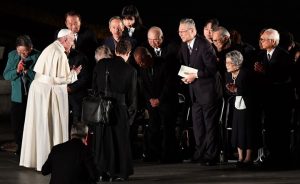Documenting Hiroshima 80 years after A-bombing: November 24, 2019, Second visit by Pope
Jun. 1, 2025
Survivor puts her soul into her speech
by Minami Yamashita, Staff Writer
On November 24, 2019, Pope Francis visited Hiroshima Peace Memorial Park in the city’s Naka Ward, where the Meeting for Peace was held by the Catholic Bishops’ Conference of Japan based in Tokyo and the Hiroshima prefectural and city governments. In the presence of the Pope and some 2,000 attendees, a representative of the atomic bomb survivors stood to deliver a speech.
Yoshiko Kajimoto, 94, a resident of Nishi Ward of Hiroshima, spoke firmly, “I believe nuclear weapons can be abolished with the power of many people who desire peace and the many souls of those who lost their lives in the atomic bombing.”
She serves as one of the A-bomb survivors who share their experiences, officially, as appointed by the Hiroshima Peace Culture Foundation. When the city government asked her to give her account before the Pope almost six months earlier, she felt honored and accepted the offer. As she was told not to disclose it even to her family, she wrote her manuscript alone, honing it again and again. Since she was given only two minutes, she said. “I had to omit a lot, but I definitely wanted to include the phrase ‘souls of those who lost their lives.’”
She was a third-year student at Yasuda Girls’ High School (now Yasuda Girls’ Junior High School and High School) when she was exposed to the bomb at a factory where she had been mobilized to work about 2.3 kilometers from the hypocenter. She was trapped under a collapsed building, but she frantically tried and managed to get out. She witnessed people with severe burns running about trying to flee.
Conveying victims’ resentment
Among the students of Yasuda Girls’ High School, 315 lost their lives in the atomic bombing. Her father searched for her after the atomic bombing. He died suddenly 18 months later. Her mother was hospitalized many times. To support her mother and three younger brothers, Ms. Kajimoto gave up her dream of becoming a teacher and worked hard at a clothing store after finishing high school. She got married and raised two children. Encouraged by her grandchildren, she began sharing her atomic bomb experience at age 70.
“I put the sentence about ‘souls’ into my speech because many people died without being able to say anything. I wanted to convey the resentment of the victims such as my father and my schoolmates.” As the day of the meeting was cold and she was tensed up, her legs trembled. But she gave an account of the horrors branded on her mind 74 years ago and the suffering in the postwar period. After her speech, people told her her description of what she saw around the time of the bombing, as well as her feelings, were conveyed to them, and that eased her mind.
Another hibakusha, Koji Hosokawa, then 91, was also scheduled to tell his account but could not attend as his health suddenly got worse. His son, Yo Hosokawa, 66, who lives in Naka Ward, helped him refine the manuscript. He said, “My father was so proud of the role; he was disappointed he could not attend.”
Mr. Hosokawa was 17 when he was exposed to the atomic bombing about 1.3 kilometers from the hypocenter. His sister, Yoko Moriwaki, was a first-year student at First Hiroshima Prefectural Girls’ High School (now Minami High School). She was mobilized for building demolition work and lost her life in the bombing. His manuscript, which was read by proxy, referred to his thought he always included in his account: “War turns people mad, and the extreme case is the atomic bomb, which negated the existence of human beings.”
Mr. Hosokawa was hospitalized about two months later. He wrote in his manuscript, “Passing on the legacy of Hiroshima to the next generation is the final mission entrusted to us hibakusha.” He was not able to continue sharing his account, and passed away in 2023 at the age of 95.
Deeply moved
Pope Francis was the second Pope to visit Hiroshima, following John Paul II, who visited the city 38 years before. Pope Francis talked to and shook hands with each A-bomb survivor invited before the Cenotaph for the A-bomb Victims. He laid flowers, and observed a moment of silence. He sent out a powerful 14-minute message, in which he said, “The use of atomic energy for purposes of war is today, more than ever, a crime.”
On the flight back to Rome, he described the visit to the A-bombed city as an experience deeply engraved in his heart and said he was deeply moved. He passed away in April this year at the age of 88. He was born in Argentina. He repeatedly appealed for the necessity of nuclear abolition during his 12-year papacy.
(Originally published on June 1, 2025)








